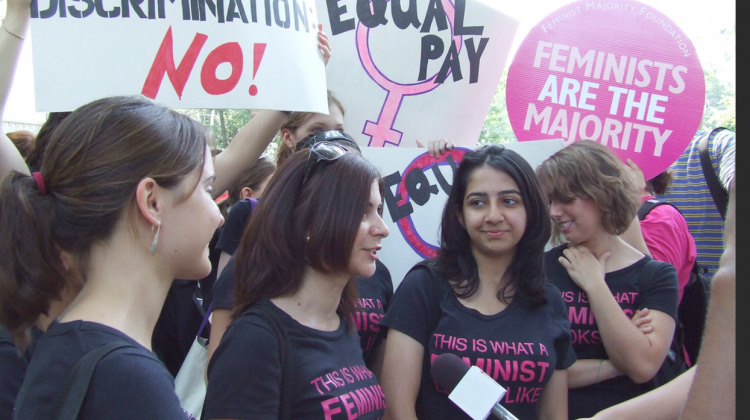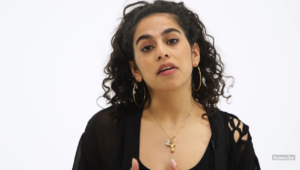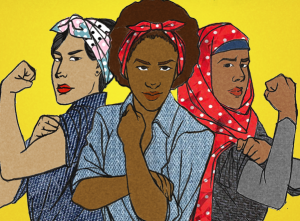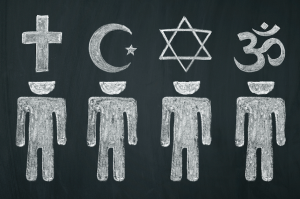
Source: Pat Taub
I’ve considered myself to be a feminist for a few years now, and being only 19 years old, that’s a pretty significant amount of time.
I can tell you first hand that young people are building this movement.I’m proud to be one of them.
But as much as I think being a feminist activist at a young age rocks, there are a lot of misconceptions and untold truths that exist culturally around what being a young feminist actually entails.
It’s not easy.
The stories that I’ve seen being told, though, are usually painted beautifully, but are unrealistic.
There’s usually a lot of “She’s so accomplished and well-spoken for her age,” “She did this all on her own,” and “She’s gone above and beyond the call of teen hood – hooray!”
And perhaps all of that is true and great and wonderful.
But what’s missing here is the very real struggles that young feminists face.
The fact is that these aren’t just personal narratives of success, but triumphs that are filled with failure, self-discovery, and personal growth.
So let’s talk about what exactly some of those struggles are.
1. Finding Opportunity
Even though there are a lot of badass feminist organizations, blogs, and groups that exist, not a lot of them are built by and for young people.
I know that in most feminist circles that I’m in, I am one of – if not the – youngest person there.
This is sometimes because of age policies, but more often, I’ve found that it goes back to the way these spaces are constructed. To even volunteer for many organizations, you need to be at least 18, or come prepared with knowledge and skills.
People often just assume that the only people interested in activism are adults.
That’s not true.
Not only is it untrue, but starting your work with this presumption leads to the exclusion of young people who do want to participate.
Even if you are given opportunities as a young person, it can often be very difficult to make it work with the other responsibilities that you have.
A high school student attends school an average of 38 hours per week and on top of that spends almost seven hours per week on homework!
Given that high school students are also expected to participate in extracurricular activities or sports (doing these types of things is often necessary when applying for college), have family responsibilities, and also often need to earn some type of income (which often means having a part-time job), there’s not a whole lot of extra time to fit activism in!
That’s why there needs to be more programing that exists to address these specific needs.
A lot of it comes down to there not being a whole lot of opportunities for young people to get paid for their work. If more paid internships and fellowships, programming, and feminist-based work designed for young people existed (since there are many opportunities for older folks), this could help bridge the age gap.
2. Not Being Taken Seriously
There’s also the dilemma of adults not viewing young people in general as intelligent, responsible, or diligent.
Most of society labels millennials as being lazy and selfish. Sadly, this is often still the dominant perspective in even activist spaces.
Young people then are forced to constantly prove themselves – to be better than anyone else in the space in order to be worthy of respect.
They have to show that yes, indeed, they can be trusted.
The opportunities that they are given are too often based in tokenism (where organizations work with young people so that they can say “look at how much we love youth and how hip we are!”) or do not actually provide much autonomy to them.
You might be stuck in a pre-defined role or program in which you have little-to-no input. You might be exploited for free labor.
This is ultimately a problem of adultism, which is a form of ageism.
Even though most people think of age prejudice as being directed towards the middle-aged and elderly, those who are not quite adults are also discriminated against in society. This problem though, has largely been ignored.
And the fact is, it’s not young people’s job to fight for their inclusion into feminist and activist spaces. It’s our job to include them and invite them into our work.
3. Having No Clue Where to Start
This was something that I personally faced.
I discovered feminism first when I was 15 and read Jessica Valenti’s book Full Frontal Feminism.
Although the ideals of feminism were appealing, it was a lot to take in, especially as someone who had never been exposed to it.
I was inspired to take action, but had no idea how. So I placed the book on my shelf and largely forgot about its existence.
What happened next was sort of a happy accident: My stepmom found out about a program taking place through my local rape crisis center that was geared towards developing youth activists and educators. We would be learning about sexual violence, as well as doing projects out in our communities that we would be compensated for.
Since I was involved in my community already (volunteering at the library, participating in media trainings, and so on), I figured this would be something interesting to do. So I applied and was one of only 15 youth from Northeastern Ohio chosen for the program.
This changed my life.
This was what brought me back to feminism, as I would check out hooks, Lorde, and MacKinnon out from their resource library, not to mention learning about gender-based violence, oppression, and privilege. It inspired me and my mentors encouraged me to take action and do more.
This led to a handful of other projects I became involved in during high school and beyond. But I’m convinced that without participating in this program, I probably wouldn’t have ever found feminism again.
This is why programs like this need to exist. And this is why we need to give girls pathways to action.
If you’re a young feminist who’s reading this and also not sure how to act on what you believe in, my advice to you is to just do something.
Research opportunities and apply for as many as you can. Start a blog. Create a feminist club at your school.
It doesn’t matter what your first action is, but whatever it is, I promise you that what you will learn from this experience and where it can take you is priceless.
4. Navigating Your Personal Life
This is a big one and can be challenging when you’re young and living at home.
Sometimes, parents won’t be on the same page with you and your feminist principals. They might try to silence you or may simply not know how to interact with you.
Unfortunately, because of common stereotypes about feminism, many people think feminists are all just angry people, man-haters, or “killjoys.”
They may try to control your appearance, grooming, or what you do.
There’s not an easy answer for this, and it was something I struggled with for a while. My parents didn’t get it, and I had no idea how to make them understand when they seemed unwilling to listen.
Young feminists: Do what feels right to you. And as difficult as it may be, try to find a balance.
Compromise with your family when you can, try to have open conversations, and most of all, be true to who you are.
Anyone who truly loves you unconditionally will accept you no matter what, even if they disagree with you.
This might mean agreeing to get a 3.5 GPA if your parents will take you to volunteer. Or you might agree not to talk about abortion with your relatives, if your parents are willing to have conversations about it with you at home.
It can be difficult to stay the course when you have a lot of opposition. But my experience is that a lot of parents assume that your feminism is a “phase” or an act of rebellion; sticking with it for a few years and through time showing your passion can make them take you more seriously.
Now my mom brags to all of her friends about the feminist activism I do and wants me to share my work with her. Things have changed, but I know a lot of that was due to time and my own personal growth.
Adults, and especially parents: Know that a lot of young feminists are going through these struggles at home.
Try to be patient and most important of all, be there to listen. Many young people don’t have a lot of outlets that aren’t in some way controlled or tied to their parents, so offer to lend an ear and understand when these struggles sometimes affect their work. It’s probably not a lack of ambition, but a lack of understanding.
5. You’re Kicking Ass!
Yes, you! All of you young feminists!
There are so many amazing activists and organizations out there that are doing great work with the young feminists of the world. Thank you for existing!
Remember that what you are doing matters, even when you doubt that you’re reaching anyone. Even one person being touched or affected by what you’re doing makes everything worth it, and I promise there are way more than one.
I’ve learned so much in the last three years of doing this. I’ve made a lot of mistakes, but also made tremendous growth. Expect this and love the process, even when it sometimes might hurt.
There is a light at the end of the tunnel. But it’s up to you to shine that beacon.
[do_widget id=”text-101″]
Want to discuss this further? Visit our online forum and start a post!
Erin McKelle is a Contributing Writer for Everyday Feminism. She’s an e-activist, video blogger, student, and non-profit advocate who has launched several projects, including Fearless Feminism and Consent is Sexy. In her spare time, Erin enjoys reading, writing bad poetry, drawing, politics and reality TV. You can visit her site here find her blogging at Fearless Feminism, Facts About Feminism, and Period Positive. Follow her on Twitter @ErinMckelle and read her articles here.
Search our 3000+ articles!
Read our articles about:
Our online racial justice training
Used by hundreds of universities, non-profits, and businesses.
Click to learn more




















